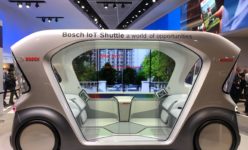High-performance charging of electric aircraft, including vertical take-off and landing (VTOL) aircraft and trucks, has presented suppliers with major challenges to date. The worldwide store network Chargepoint has now presented a concept design for a two-megawatt plug as the basis for this new concept. ChargePoint maintains a store network partnership with Uber Elevate and made the announcement at the second annual Elevate Summit, held May 8-9 in Los Angeles.
In view of the transition to electrified trucks and aircraft expected in the coming years, the concept design is a proposal for high-performance charging applications and initiates discussions on a uniform connector in the industry. Uber plans to enter the first of its so-called “Elevate” markets (Los Angeles, Dallas and Dubai) as early as 2020. According to analysts, fifteen percent of the trucks sold worldwide will already be electrified by 2030.
Aircraft manufacturers are already testing electric drives for a number of applications, which could lead to cost savings of several hundred billion dollars in this industry sector.
“The powertrain debate is over and electrification has established itself as a drive method in all transport categories, which is reflected in the growing interest in electrifying trucks, aircraft and beyond,” explains Pasquale Romano, President and CEO of ChargePoint, Inc. The new design not only provides a first look at a single industry connector that can be useful to truck and aircraft manufacturers and operators, but is also the impetus for an important discussion in the industry”.
Many of the loading requirements for heavy goods vehicles are similar across the different categories: electric trucks and aircraft have the same loading requirement profile and both require high-performance, fast loading processes. These common requirements suggest the need for a single connector, the benefits of which are obvious: A uniform connector not only reduces complexity for manufacturers, drivers and pilots, but also reduces costs and ensures economies of scale.
“Celina Mikolajczak, Director of Engineering, Energy Storage Systems at Uber, says: “We are proud to be working with ChargePoint, an industry leader in the development of turbocharging solutions for eVTOL aircraft. “ChargePoint has extensive experience in the areas of security, reliability and user-friendliness, which is reflected in robust connector and charging systems. The success in the development and large-scale installation of automotive charging systems reinforces our confidence that ChargePoint can develop and install world-class aircraft charging systems that will one day be in operation on the Skyports of the future.
Four interfaces required for the battery management systems (BMS)
ChargePoint’s engineering team focused on several key factors in developing the new design. Up to four interfaces for the battery management systems (BMS) and four 500 amp circuits for the power supply are required to achieve the required performance. Each circuit will have a voltage range of 200 to 1,000 volts. To enable autonomous transfer of data and vehicle information, high-speed data transmission has also been added. Since heavy goods traffic places high demands on robustness, the connector must withstand the stresses of frequent use, but at the same time be easy to plug in and remove. A motorized system assists the inserting process, while the robust construction offers protection against falls and the often rough handling when loading heavy-duty vehicles. The connector also supports optional liquid cooling during the charging process of aircraft and trucks and can be operated either manually or robot-controlled.
High-performance charging with the ultra-fast Express Plus loading platform
ChargePoint has been a charging partner of Uber’s Elevate initiative since 2017; both companies have joined forces to drive the innovations that will bring a fleet of VTOL electric aircraft into service within five years. To develop the specific designs for the Skyports where VTOL aircraft park and charge in everyday use, ChargePoint relies on its ultra-fast Express Plus loading platform.
Uber announced last year that it intends to hold flight demonstrations in the first Elevate cities in the USA – in Dallas-Fort Worth/Frisco in Texas and in Los Angeles – as early as 2020 and will also offer commercial Elevate services in these cities from 2023. To makeAIR a reality, U has partnered with several experienced aircraft manufacturers who will develop VTOL electric vehicles, including Aurora Flight Sciences, Pipistrel Aircraft, Embraer and Bell Helicopter. Last autumn, Uber signed a Space Act Agreement with NASA to develop new concepts for the management of unmanned traffic and unmanned air systems that ensure safe and efficient operations at low altitudes. To create Skyports for the uberAIR network, Uber has also entered into partnerships with the real estate companies Hillwood Properties and Sandstone Properties. According to Uber’s analysis, electric aircraft will travel at speeds of up to 320 km/h; after several years of operation, the company expects a trip with Uber Elevate to cost the same as a UberX trip over the same distance.
More posts from the category “News”:
Post a Comment
You must be logged in to post a comment.























